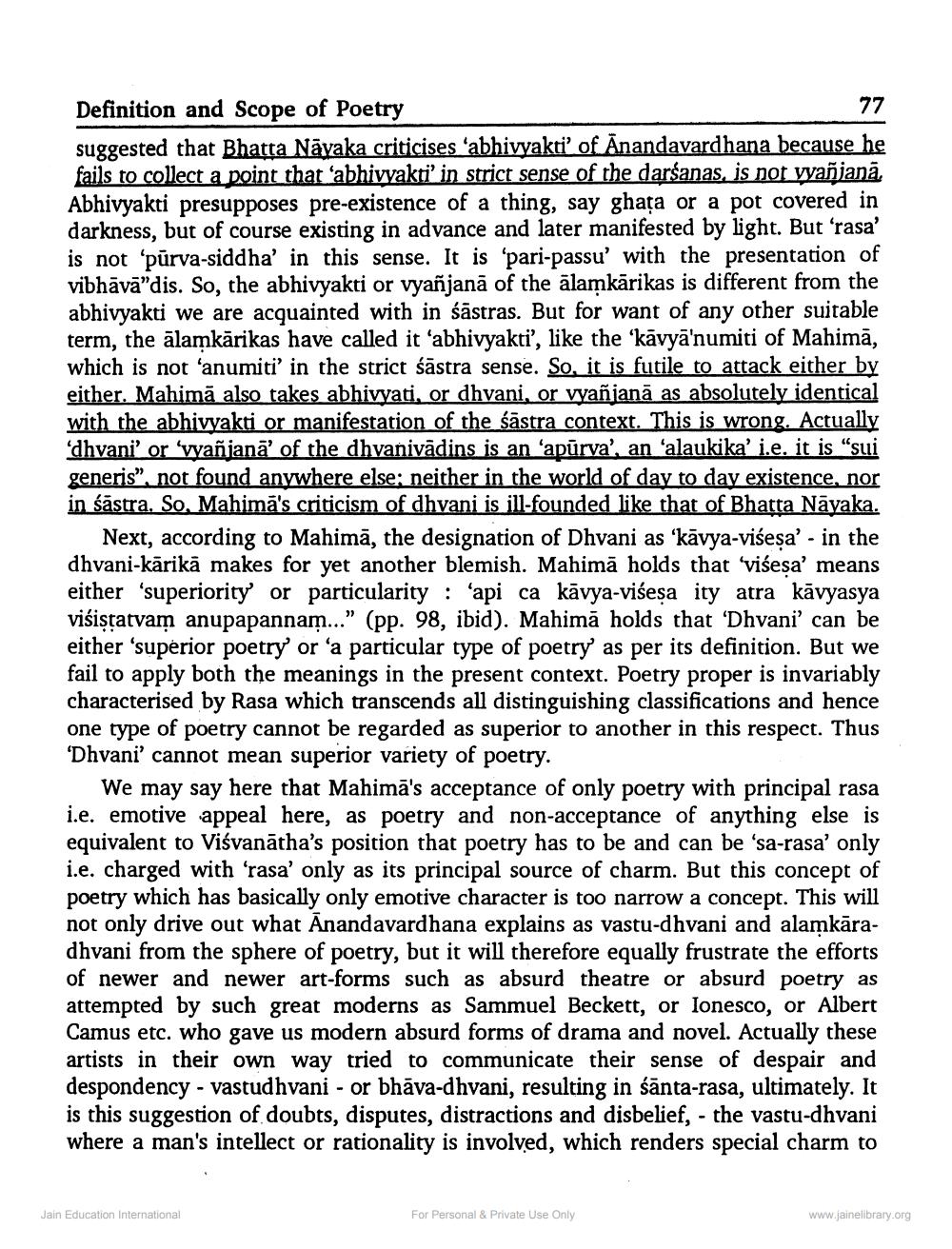________________
Definition and Scope of Poetry
77 suggested that Bhatta Nāvaka criticises 'abhivvakti' of Anandavardhana because he fails to collect a point that 'abhivvakti' in strict sense of the darśanas, is not vyañjanā, Abhivyakti presupposes pre-existence of a thing, say ghata or a pot covered in darkness, but of course existing in advance and later manifested by light. But 'rasa' is not 'pūrva-siddha' in this sense. It is 'pari-passu' with the presentation of vibhāvā"dis. So, the abhivyakti or vyañjanā of the alamkārikas is different from the abhivyakti we are acquainted with in śāstras. But for want of any other suitable term, the alamkārikas have called it abhivyakti', like the 'kavyā'numiti of Mahimā, which is not anumiti' in the strict śāstra sense. So, it is futile to attack either by either. Mahimā also takes abhivyati, or dhvani, or vyañjanā as absolutely identical with the abhivyakti or manifestation of the śāstra context. This is wrong. Actually dhvani' or 'vyañjanā' of the dhyanivādins is an 'apūrva', an 'alaukika' i.e. it is “sui generis", not found anywhere else: neither in the world of day to day existence, nor in sastra. So, Mahima's criticism of dhvani is ill-founded like that of Bhatta Nāvaka.
Next, according to Mahimā, the designation of Dhvani as 'kāvya-visesa' - in the dhvani-kārikā makes for yet another blemish. Mahimā holds that 'viấesa' means either 'superiority or particularity : ‘api ca kāvya-viśesa ity atra kāvyasya viśistatvam anupapannam...” (pp. 98, ibid). Mahimā holds that 'Dhvani' can be either 'superior poetry or 'a particular type of poetry as per its definition. But we fail to apply both the meanings in the present context. Poetry proper is invariably characterised by Rasa which transcends all distinguishing classifications and hence one type of poetry cannot be regarded as superior to another in this respect. Thus 'Dhvani' cannot mean superior variety of poetry.
We may say here that Mahimā's acceptance of only poetry with principal rasa i.e. emotive appeal here, as poetry and non-acceptance of anything else is equivalent to Viśvanātha's position that poetry has to be and can be 'sa-rasa' only i.e. charged with 'rasa' only as its principal source of charm. But this concept of poetry which has basically only emotive character is too narrow a concept. This will not only drive out what Anandavardhana explains as vastu-dhvani and alamkāradhvani from the sphere of poetry, but it will therefore equally frustrate the efforts of newer and newer art-forms such as absurd theatre or absurd poetry as attempted by such great moderns as Sammuel Beckett, or Ionesco, or Albert Camus etc. who gave us modern absurd forms of drama and novel. Actually these artists in their own way tried to communicate their sense of despair and despondency - vastudhvani - or bhāva-dhvani, resulting in śānta-rasa, ultimately. It is this suggestion of doubts, disputes, distractions and disbelief, - the vastu-dhvani where a man's intellect or rationality is involved, which renders special charm to
Jain Education International
For Personal & Private Use Only
www.jainelibrary.org




